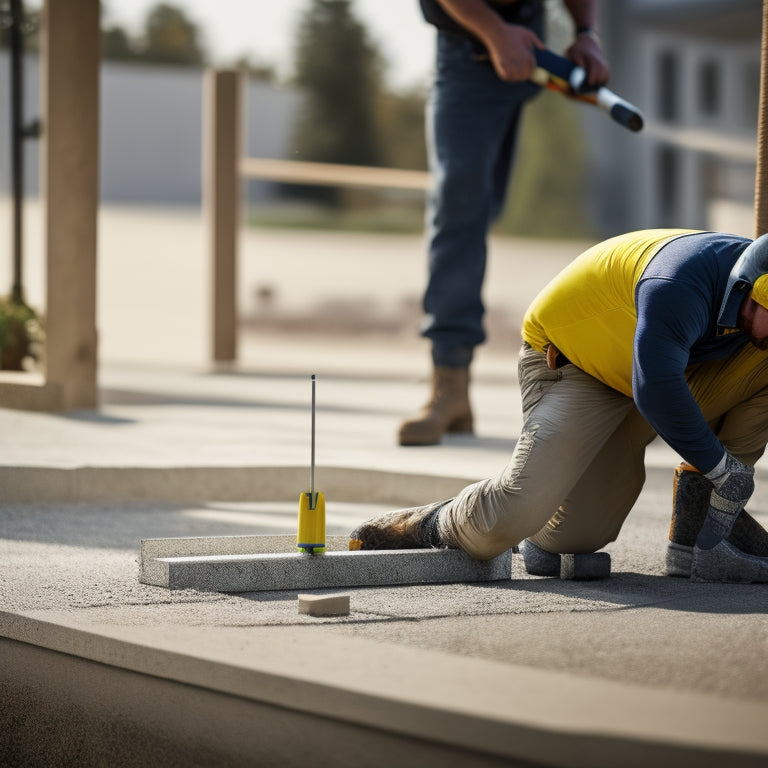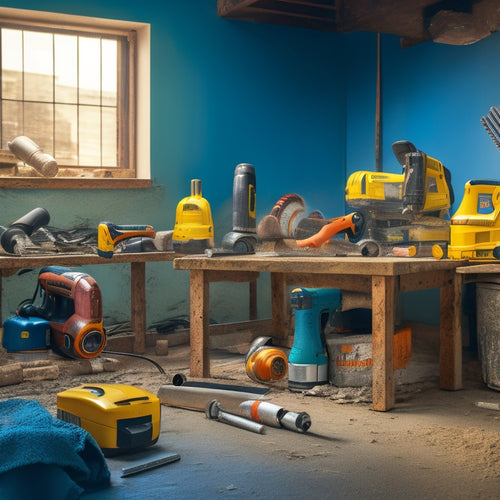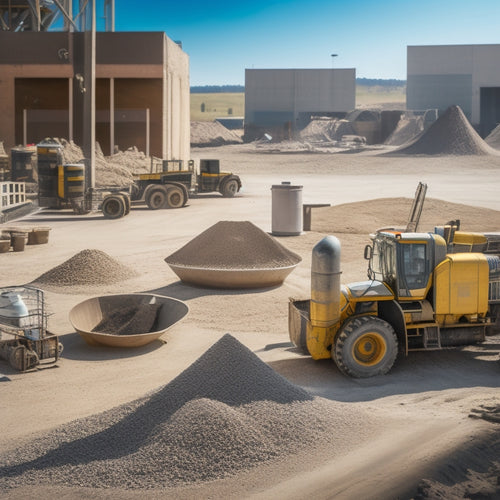
Leveling Tools for a Smooth Concrete Exterior
Share
When it comes to achieving a smooth concrete exterior, you'll need the right leveling tools to guarantee accuracy, precision, and a professional finish. Invest in a laser level for precision grading, a spirit level for fine-tuning the foundation's grade, and a digital level for precise, objective measurements. These tools will help you detect deviations, measure slope, and make adjustments as needed. By using the right leveling tools, you'll reduce the risk of errors and guarantee a smooth, even finish. Now, discover the specific techniques and best practices to get the most out of these tools and take your concrete exterior to the next level.
Key Takeaways
• Invest in a laser level for precision in grading and detecting high and low spots on the concrete exterior.
• Use a spirit level to fine-tune the concrete foundation's grade and check for deviations in multiple directions.
• Digital levels provide precise, objective measurements, eliminating human error and ensuring accurate concrete exterior alignment.
• Automatic leveling systems streamline workflow, reduce labor costs, and enhance project efficiency by eliminating manual adjustments.
• Practice and patience, combined with the right leveling tools, lead to professional-looking results and a smooth concrete exterior.
Concrete Block Leveling Essentials
When setting out to level concrete blocks, you must first confirm you have the necessary tools and a thorough understanding of the process to achieve accurate and consistent results. This includes a spirit level, string lines, and a rubber mallet, among others.
Familiarize yourself with block alignment techniques, such as using a string line to guide your block placement and verifying each block is aligned with the course above and below. Proper mortar consistency is also essential; aim for a mix that's not too wet or too dry, as this can affect the block's stability.
To achieve the best mortar consistency, follow tips such as using the correct ratio of cement to sand, adding water gradually, and mixing thoroughly. By mastering these fundamental skills, you'll be well on your way to laying a level and stable concrete block foundation.
Remember to work methodically, taking your time to confirm each block is precisely placed and leveled before moving on to the next. With practice and patience, you'll develop the skills needed to achieve professional-looking results.
Laser Levels for Accurate Grading
For accurate grading, you'll want to invest in a laser level, a precision tool that projects a level plane or line, allowing you to quickly and easily identify high and low spots in your concrete foundation.
This advanced technology enables you to achieve precise grading techniques, ensuring a smooth and even surface. Laser levels use laser technology to emit a beam that creates a reference point, making it easy to detect deviations from the desired level.
When using a laser level, you can set the device to project a level line or plane, depending on the specific requirements of your project. This allows you to check the grade of your concrete foundation and make adjustments as needed.
With a laser level, you can work efficiently and accurately, saving time and reducing the risk of errors. By incorporating a laser level into your grading techniques, you'll be able to achieve a professional-grade finish that meets the highest standards.
Spirit Levels for Precision Control
You'll turn to spirit levels, also known as bubble levels, to fine-tune your concrete foundation's grade, guaranteeing precise control over even the slightest deviations from the desired level.
These tools are essential for achieving a smooth, even finish. With a spirit level, you can accurately measure the slope of your concrete surface, making adjustments as needed to guarantee it's perfectly level.
When using a spirit level, keep the following tips in mind:
-
Always place the level on a stable, firm surface to guarantee accurate readings.
-
Use the level to check for deviations in multiple directions, as even slight variations can affect the overall grade.
-
Take multiple readings at different points on the surface to guarantee consistency and accuracy.
Digital Levels for Enhanced Accuracy
Digital levels take accuracy to the next level by providing precise, objective measurements that eliminate human error and guarantee your concrete foundation meets exacting specifications.
You'll appreciate the reliability and speed of these advanced tools, which utilize electronic leveling technology to deliver accurate readings in real-time. With digital inclinometers, you can measure angles, inclination, and surface levels with unprecedented precision, ensuring your concrete exterior is perfectly aligned and even.
When working with concrete, even the slightest deviation from level can have significant consequences. Digital levels give you the confidence to make critical decisions about your project, knowing that your measurements are accurate and trustworthy.
These tools are also incredibly versatile, suitable for a wide range of applications, from foundation work to finished flooring. By incorporating digital levels into your workflow, you'll experience a significant reduction in errors, rework, and associated costs.
With their precision, speed, and reliability, digital levels are an indispensable asset for any concrete professional seeking to deliver high-quality results.
Automatic Leveling Systems Benefits
Automatic leveling systems streamline your concrete construction workflow by eliminating tedious manual adjustments and ensuring precise surface levels, thereby reducing labor costs and enhancing overall project efficiency. By automating the leveling process, you can focus on other critical aspects of your project, knowing that your concrete exterior will be smooth and even.
These systems offer several benefits, including:
-
Faster project completion: Automated adjustments save time and labor, allowing you to complete projects more quickly and efficiently.
-
Improved accuracy: Automatic leveling systems eliminate human error, ensuring that your concrete surface is perfectly level and even.
-
Enhanced compatibility with self-leveling compounds: These systems work seamlessly with self-leveling compounds, ensuring a smooth finish and minimizing the need for manual adjustments.
Frequently Asked Questions
How Often Should I Calibrate My Leveling Tool for Optimal Results?
You should calibrate your leveling tool regularly to guarantee ideal results.
The calibration frequency depends on usage, but as a general rule, you should recalibrate every 3-6 months or after 500-1000 uses.
Failure to do so can impact accuracy, leading to inconsistencies and errors.
Can I Use a Leveling Tool on Uneven or Rough Surfaces?
Imagine maneuvering a treacherous terrain, where every step is a gamble. That's what it's like to work on an uneven or rough surface without proper preparation.
Can you use a leveling tool on such surfaces? The answer is yes, but it's essential to prioritize surface preparation.
You'll need to select the right tool for the job, considering factors like surface roughness and tool versatility. By doing so, you'll guarantee accurate readings and a smooth finish.
What Is the Ideal Temperature Range for Using Leveling Tools?
When working with leveling tools, you'll want to operate within an ideal temperature range to guarantee peak performance.
Typically, this falls between 40°F and 90°F (4°C and 32°C). Outside this range, temperature effects can greatly impact tool performance.
Extreme temperatures can alter the material's viscosity, affecting flow and leveling accuracy. By working within this sweet spot, you'll achieve the best results and minimize potential issues.
How Do I Ensure My Leveling Tool Is Waterproof and Durable?
'Measure twice, cut once' is a mantra that applies to ensuring your leveling tool is both waterproof and durable.
You'll want to prioritize tools made from waterproof materials, such as stainless steel or high-quality polymers, to prevent water damage.
Additionally, look for durable construction features like sealed electronic components and reinforced handles.
Can Leveling Tools Be Used for Both Indoor and Outdoor Projects?
You're wondering if your leveling tool can handle both indoor and outdoor projects. The answer is yes, many leveling tools are designed to be versatile and can be used in various environments.
For indoor applications, you'll want to guarantee the tool is precise and won't damage sensitive surfaces.
For outdoor projects, look for tools with weather-resistant materials and durable construction to withstand harsh conditions.
Conclusion
As you stand back to admire your smooth concrete exterior, you're not just gazing at a flawless finish - you're beholding a symphony of precision, a harmonious blend of art and science.
Just as a master conductor orchestrates perfect harmony, you've expertly wielded leveling tools to create a concrete masterpiece.
With every level, every grade, and every measurement, you've composed a work of art that echoes the precision of a Swiss watch.
Your concrete exterior is a reflection of your skill, a symphony of perfection that will resonate for years to come.
Related Posts
-

Best Tools for Concrete Restoration and Repair
When tackling concrete restoration and repair projects, you need a range of reliable tools to achieve professional-gr...
-

Essential Power Tools for Concrete Block Construction
When building with concrete blocks, you'll need a range of power tools to cut, drill, mix, and finish the blocks to g...
-

Why These Concrete Tools Are Always in Demand
You rely on a set of trusted concrete tools to deliver high-quality results, and it's not surprising - these tools ar...


